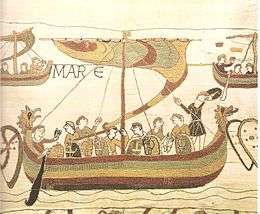Port and starboard

Port and starboard are nautical terms for left and right, respectively. Port is the left-hand side of or direction from a vessel, facing forward. Starboard is the right-hand side, facing forward. Since port and starboard never change, they are unambiguous references that are not relative to the observer.[2][3]
The term starboard derives from the Old English steorbord, meaning the side on which the ship is steered. Before ships had rudders on their centrelines, they were steered with a steering oar at the stern of the ship and, because more people are right-handed, on the right-hand side of it. The term is cognate with the Old Norse stýri (rudder) and borð (side of a ship). Since the steering oar was on the right side of the boat, it would tie up at wharf on the other side. Hence the left side was called port.
Formerly larboard was used instead of port. This is from Middle-English ladebord and the term lade is related to the modern load.[3] Larboard sounds similar to starboard and in 1844 the Royal Navy ordered that port be used instead.[4] The United States Navy followed suit in 1846. [5] Larboard continued to be used well into the 1850s by whalers. In Old English the word was bæcbord, of which cognates are used in other European languages, for example as the present Dutch bakboord, the German backbord and the French term bâbord (derived in turn from Middle Dutch).
At night, the port side of a vessel or aircraft is indicated with a red navigation light and the opposite side with a green one, to help avoid collisions. The International Regulations for Preventing Collisions at Sea state that a ship on the left must give way to a ship on its right. If the courses of two boats are intersecting, the helmsman usually gives way to a red light by going around the stern of the stand-on vessel. Sidelights are each lit from right ahead to 22.5 degrees abaft the beam on its corresponding side. A mnemonic for this is "If to starboard red appear, 'tis your duty to keep clear. Green to green, red to red perfect safety, go ahead."
References
- ↑ Wolfgang Grape, The Bayeux Tapestry, Prestel. ISBN 3-7913-1365-7. p. 95.
- ↑ "Why do ships use "port" and "starboard" instead of "left" and "right?"". NOAA. Retrieved May 18, 2015.
- 1 2 "Why do sailors say 'port' and 'starboard', for 'left' and 'right'?". Royal Museums Greenwich. Retrieved 9 July 2015.
- ↑ Norie, John William; Hobbs, J. S. (1847) [1840]. Sailing directions for the Bay of Biscay, including the coasts of France and Spain, from Ushant to Cape Finisterre ("A new ed., rev. and considerably improved" ed.). C. Wilson. p. 1. OCLC 41208722. Retrieved 7 February 2010.
An order, recently issued by the Lords Commissioners of the Admiralty, states, that in order to prevent mistakes, which frequently occur from the similarity of the words starboard and larboard, in future, the word port is to be substituted for larboard, in all Her Majesty’s ships or vessels.